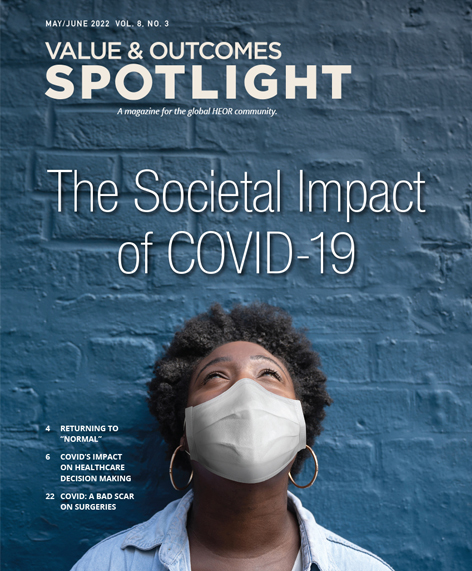Research Roundup
Section Editor: Aakash Bipin Gandhi, BPharm, PhD, Research Scientist, RWE, Sanofi, Cambridge, MA, USA
The broader societal impacts of COVID-19 and the growing importance of capturing these in health economic analyses.
Schnitzler L, Janssen LM, Evers SM, et al. Int J Technol Assess Health Care. 2021;37:e43. doi.org/10.1017/S0266462321000155
Summary
The article by Schnitzler et al discusses the societal impact of COVID-19 on factors external to the healthcare system such as (including but not limited to) labor markets and work productivity. Further, it highlights the importance of incorporating these aspects in any analysis that assesses the economic impact (where available and appropriate) of COVID-19 to provide a comprehensive characterization of its public health consequences. Additionally, the article sheds light on how the pandemic revealed and further worsened gender, health, and socioeconomic disparities associated with contracting the virus, bearing the burden of household tasks, and access to essential healthcare services.
Relevance
Any economic analysis related to COVID-19 conducted from a single or narrow perspective may exclude key societal impacts related to the disease and associated indirect costs that constitute a major proportion of the economic impact of the disease. Further, quantifying the societal impact of COVID-19 within an economic analysis can help guide healthcare and policy decision makers with the efficient allocation of scarce healthcare resources towards managing the disease.
A comprehensive COVID-19 response—the need for economic evaluation.
Persad G, Pandya A. N Engl J Med. 2022 May 4. Online ahead of print. doi: 10.1056/NEJMp2202828.Summary
The article by Persad and Pandya discusses the use of economic evaluations to study the cost and consequences of COVID-19–related health policies. Certain COVID-19 policy initiatives have been studied more comprehensively compared to others due to the easy availability of data. For example, policies supporting improvement of access to vaccines is supported by a wide array of literature highlighting its safety and cost-effectiveness. In contrast, policies supporting improving ventilation that helps decrease COVID-19 transmission has not been studied well due to the lack in the quantity and quality of associated data. Further, the article stresses the need of including societal effects within economic evaluations to aid in healthcare decision making and increasing transparency regarding the parameters inputted in the model.
Relevance
The economic evaluation of healthcare policies offers several benefits. First, in addition to quantifying the costs or benefits associated with a policy, economic evaluations can help aid the creation of dashboards to guide decision makers in interpreting disaggregated data. Second, economic evaluations can help determine the society’s threshold for accepting healthcare policies that are aimed at improving population health through the equitable distribution of health outcomes. Third, uncertainty associated with healthcare policies can also be quantified through economic evaluations. For example, value of information analysis can be conducted to decide whether it is feasible to bear a certain amount of economic burden in order to gain benefits from a certain policy.
COVID-19 and resilience of healthcare systems in ten countries.
Arsenault C, Gage A, Kim MK, et al. Nat Med. 2022 Mar 14. Online ahead of print. doi: 10.1038/s41591-022-01750-1.
Summary
The study by Arsenault et al assessed the impact of the COVID-19 pandemic on the decline in health service use across 10 countries that were categorized as low-income (Ethiopia, Haiti), middle-income (Ghana, Lao People’s Democratic Republic, Mexico, Nepal, South Africa, Thailand) and high-income (Chile, South Korea). The study found that services such as cancer screening, tuberculosis screening, and HIV testing declined by 26% to 96% during the pandemic. Additionally, total outpatient visits (9% to 40%) and visits related to maternal health (5% to 33%) also declined over the same period. The study used an interrupted time-series analysis where the interruption was identified to the be 11 March 2020 (announcement by the World Health Organization declaring a global pandemic) with a 15-month baseline and 9-month follow-up period. The Routine Health Information System data, as well as data from the several national administrative health systems, were used for the analysis.
Relevance
The findings of this analysis on reduced health service use due to COVID-19 highlight the need for pandemic preparedness globally. There is a need to design healthcare systems in a way that they are more resistant to adverse consequences that may arise during future pandemics and retain the ability to function efficiently even in time of crisis.
Note from the Section Editor: Views, thoughts, and opinions expressed in this section are my own and not those of any organization, committee, group, or individual that I am affiliated with.

